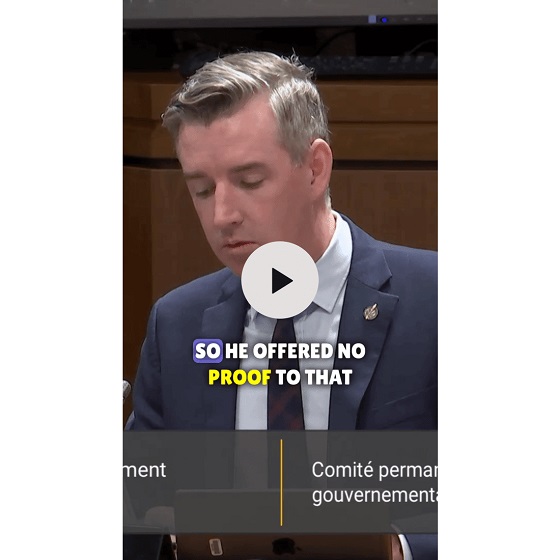Opinion
GCStratagies owner Darren Anthony comes to committee- A Masterclass in Evasion

From The Opposition with Dan Knight
Evasion and Lying at OGGO – Unraveling the Darren Anthony Chapter
It’s not every day that you get a clear view straight into the murky depths of the swamp, but ladies and gentlemen, the last two days at the OGGO committee with GC Strategies’ own Darren Anthony and Kristian Firth were nothing short of a political circus, a real exhibition of the swamp at its most flagrant.
Let’s break this down, because this isn’t just a story; it’s a case study in how the swamp operates, how it thrives on confusion, obfuscation, and, let’s face it, outright deceit.
Kristian Firth and Darren Anthony, the dynamic duo from GC Strategies, walked away with over two million dollars from the ArriveCan debacle. But this wasn’t just a lucrative contract; it was a masterclass in swamp tactics. Botler AI, the automated guardian of truth, flagged these gentlemen for altering their CVs. Yes, you heard that right. Meanwhile, the Auditor General unearthed a little creative writing exercise in their contract submissions—copy, paste, repeat.
And then there’s the hacking claim. Oh, the drama! Botler AI was allegedly compromised. But who did it, and how convenient was the timing?
But hold on, it gets better. Darren Anthony, in a performance that would have Hollywood calling, claimed he had absolutely nothing to do with ArriveCan. Nothing! Imagine that. And his defense for Firth? Well, it was less of a defense and more of an “I choose to know nothing” stance. Government reports? Never seen them, never read them. It’s like the man is living in a bubble – or perhaps, a swamp bubble.
Seriously, if Darren Anthony was aiming to salvage his reputation, he missed the mark by a country mile. It’s one thing to be out of the loop; it’s another to be so out of touch that you become a caricature of ignorance.
So, in the spirit of public service, I’ve distilled four hours of committee theatrics into 14 minutes of unmissable drama. This is not just about GC Strategies or Darren Anthony trying to dance around the truth. This is about exposing the tactics, the maneuvers, and the outright gall of those who think they can navigate the swamp without getting dirty.
So tune in, folks. This is more than a recap; it’s an exposé. It’s a reminder that the fight against the swamp is ongoing. We must remain vigilant, we must demand transparency, and above all, we must never let the architects of confusion dictate the narrative.
Stay sharp, Canada. The swamp is deep, but the truth is clear. Let’s drain it, one revelation at a time. Enjoy the show.
Subscribe to The Opposition with Dan Knight .
2025 Federal Election
Fifty Shades of Mark Carney

 Trish Wood is Critical
Trish Wood is Critical
Now we are seeing what happens when the lines are blurred between what is private and what is public — a linkage that defines the ESG and sustainability cult. Carney is on a let’s build more housing kick. His brave new builds are modular and pre-fabricated little gems that will, according to Carney, end the housing crisis that he hopes we’ll forget that he and Trudeau caused.
There are a million good questions that accompany an announcement like this. Where? Do we have the infrastructure to support this? What will the influx of buildings and humans do to the people already living in the area? Just for starters.
Isn’t it interesting that Brookfield, is now heavily invested in the modular building sector.
The biggest question to Carney should be — will you personally, through the stocks in your Brookfield portfolio be profiting from such builds? Remember that his blind trust is only blind to us – but we do know he holds significant stock options in Brookfield.
Will this European-based company be off the government’s supplier’s list? Or are we heading to a Soviet-style tender process where our political leaders openly grift in order to enrich themselves?
I was glad to hear Stephen Harper quash the falsehood the it was Carney who single-handedly saved Canada’s economy in 2008 by lowering the Bank of Canada interest rate.
A Toronto Star piece this morning reports what many of us have known all along. It was Stephen Harper and his beloved Finance Minister, Jim Flaherty who did the heavy lifting that Carney now claims credit for. And given that our institutions weren’t involved in the sleazy, credit default swaps that tanked the American economy, including a couple of banks — the situation here was not nearly as dire.
As I’ve said on my podcast, Carney like Hillary Clinton has a glossy resume but the tiniest bit of investigation suggests many of their endeavours were failures. But let’s not cloud the Carney coronation with facts when we can sit back and admire his power suits and imperious countenance. Fifty Shades, indeed.
Stay critical.
#truthovertribe
Trish Wood is Critical is a reader-supported publication.
To receive new posts and support my work, consider becoming a free or paid subscriber.
2025 Federal Election
Corporate Media Isn’t Reporting on Foreign Interference—It’s Covering for It


 Dan Knight
Dan Knight
A CCP-linked propaganda campaign boosted Mark Carney, but instead of sounding the alarm, the CBC cast him as the victim. The truth? He wasn’t targeted—he was the beneficiary.
So let’s stop pretending. The headlines, the bureaucratic spin, the carefully worded talking points—none of it changes what actually happened. This week the Canadian government just confirmed what they’ve been denying for years: the Chinese Communist Party is interfering in our elections. Not in theory. Not in the abstract. Right now. In real time.
And who’s the beneficiary? It’s not the opposition. It’s not the people calling out foreign interference. It’s not the Conservative candidates getting smeared, doxxed, or targeted by digital hit jobs. No, the beneficiary is the man now leading the Liberal Party. The man who was handpicked to replace Trudeau and keep the globalist machine running smoothly. That man is Mark Carney.
According to the SITE Task Force—the very same group tasked with monitoring foreign interference—a CCP-linked WeChat account ran coordinated messaging in Chinese-language communities across Canada. That messaging didn’t attack Carney. It elevated him. It portrayed him as a strong, capable leader, someone who would stand up to the United States. That’s not an attack. That’s not foreign meddling meant to sow chaos. That’s targeted influence designed to shape an outcome. To tip the scale.
So what did the press do with this information? CBC, CTV, the Globe and Mail—they all ran with the same disingenuous line: “Chinese information operation focused on Carney.” Focused? That’s the best they could do? He wasn’t the focus. He was the favorite. He wasn’t the target. He was the chosen candidate. The state broadcaster, which receives $1.2 billion a year in taxpayer funds, chose to frame a CCP influence operation that benefited Carney as if he were the victim. And they wonder why trust in media is collapsing.
Meanwhile, who was actually targeted? Joe Tay. A Conservative candidate. A Canadian citizen. And someone with the courage to speak out against Beijing’s repression. For that, the Hong Kong government—acting on orders from the CCP—put a bounty on his head. HK$1 million for his arrest. And then, in an absolutely disgraceful moment, Liberal MP Paul Chiang repeated that bounty in public, in Canada, saying someone could take Tay to the Chinese consulate and claim the reward.
What was Carney’s response? He called it a “lapse in judgment.” A “teachable moment.” Chiang remained a candidate until the scandal became too big to ignore and the resignation came—conveniently timed just before midnight. And not once—not once—did Carney publicly condemn the CCP. Not once did he say the name of the regime running operations to influence Canadian politics. Not once did he call out the foreign government targeting his opponents and helping him.
Why would he? He doesn’t want the interference to stop. He and the Liberals have benefited from it before—just ask Han Dong in Don Valley North—and they’re benefiting from it now. This isn’t hesitation. It’s a pattern. A Liberal MP parrots a CCP bounty and they defend him. A CCP media operation boosts their leader and they stay quiet. CSIS warns them about Beijing’s interference and they bury it. Every time, they play dumb. Every time, it’s the same excuse: no impact, no problem, nothing to see here.
But Canadians are not blind. They can see what’s happening. They can see who benefits. And they’re starting to realize that this isn’t about safeguarding democracy. It’s about safeguarding a narrative. Because when your elections are being massaged by foreign powers, and your media is too compromised to call it out, the system doesn’t just have a problem. It has a crisis.
And if we don’t deal with it now—if we let Beijing call the shots and let the CBC clean up the mess—then we’re not a democracy anymore. We’re a client state. And the country we thought we had will be gone. Quietly. Carefully. And permanently.
-

 2025 Federal Election2 days ago
2025 Federal Election2 days agoMark Carney Comes to B.C. and Delivers a Masterclass in Liberal Arrogance
-

 2025 Federal Election2 days ago
2025 Federal Election2 days agoPoilievre to invest in recovery, cut off federal funding for opioids and defund drug dens
-

 Podcasts2 days ago
Podcasts2 days agoThe world is changing – Trump’s Tariffs, the US, Canada, and the rest of the world
-

 Business2 days ago
Business2 days agoTrump threatens additional 50% tariffs on China, urges ‘patience’
-

 Alberta2 days ago
Alberta2 days agoProvince introducing “Patient-Focused Funding Model” to fund acute care in Alberta
-

 Alberta2 days ago
Alberta2 days agoMedical regulator stops short of revoking license of Alberta doctor skeptic of COVID vaccine
-

 International2 days ago
International2 days agoUN committee urges Canada to repeal euthanasia for non-terminally ill patients
-

 MacDonald Laurier Institute2 days ago
MacDonald Laurier Institute2 days agoRushing to death in Canada’s MAiD regime












